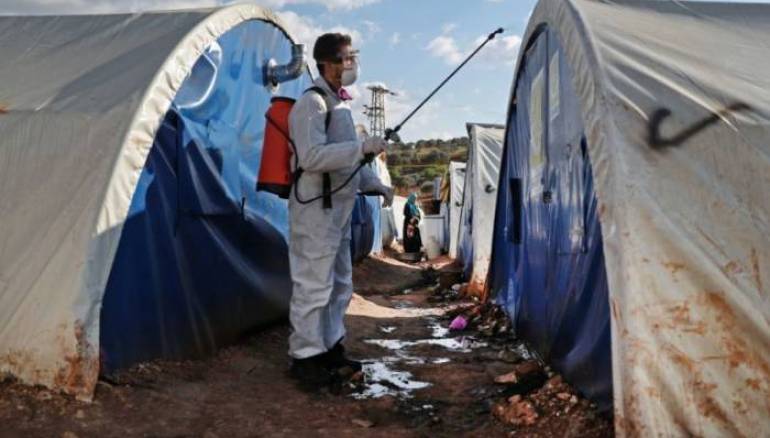Two displaced Syrian are in quarantine in Atmeh Hospital at the Turkish border, with medics suspecting they have been infected with coronavirus.
Medics say they are waiting on the results of tests which have been sent to Turkey.
Coronavirus infections have yet to be recorded in the large parts of Syria outside regime control – the east, northeast and northwest.
In the opposition-held northwest, rescue workers whose usual role is to respond to government bombardments have been sanitizing classrooms. Medics in the northwest fear the virus would spread very quickly in crowded camps for the displaced.
All the countries bordering Syria have coronavirus outbreaks.
The Minister of Health in the Syrian opposition’s Interim Government, Doctor Maram al-Sheikh, told Zaman Al-Wasl that one more coronavirus case is in quarantine in the Afrin region north of Aleppo.
The rebel-held northwest was already facing a major humanitarian crisis with nearly one million people displaced by fighting in the past few months as the Russain-backed regime mounted an offensive.
Although the regime says it has yet to document any infections, Syria is considered be a high risk nation.
“We have vulnerable populations in camps, refugees, and slum areas at the outskirts of large urban centers,” the World Health Organization’s Syria representative, Nima Saeed Abid, told Reuters.
“If we take the scenarios in China or even in Iran, we are expecting we may have large number of cases and we are preparing accordingly.”
The entry ban announced overnight by Damascus followed the closure of schools, parks, restaurants and various public institutions. A health hotline is being launched, Health Minister Nizar Yazigi said.
He also responded to suggestions of a cover-up.
“The health ministry is the only source of information about this matter and not rumors circulating on social media,” the state news agency quoted him as saying on Thursday. “When there is an infection, it will be announced.”
Meanwhile, Syrian activists and former detainees have called on the Syrian regime to release the inmates to protect them against the killer coronavirus pandemic.
Most of the opposition detainees are held in the notorious Sednaya Military Prison in miserable conditions.
The Syrian Network for Human Rights recorded that at least 1.2 million Syrian citizens were subjected to arrest and torture, and approximately 147,000 people are still under arbitrary detention or enforced disappearance and torture.
Nearly 305,000 people have now been confirmed with the coronavirus globally, and while at least 95,000 people have recovered from COVID-19, more than 13,000 have died, according to data from Johns Hopkins University in the US.
This article was edited by The Syrian Observer. The Syrian Observer has not verified the content of this story. Responsibility for the information and views set out in this article lies entirely with the author.


